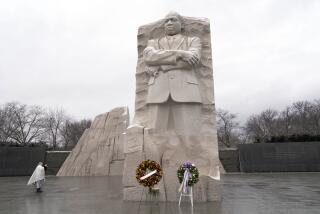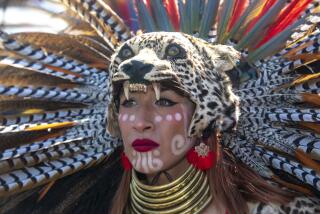Appeal of Kwanzaa Continues to Grow
- Share via
It’s a nonreligious, strictly cultural African American holiday--and it’s only 32 years old. Nevertheless, Kwanzaa has rapidly joined the growing list of winter holidays in America’s ever more diverse culture.
One example blares from the front page of the Brea Ministerial Assn.’s December newsletter: “Merry Christmas, Happy Hanukkah, Holy Ramadan and Joyous Kwanzaa!” reads the cheerful ecumenical headline.
Kwanzaa, which starts today and runs through Friday, was created after the Watts riots by Maulana Karenga, chairman of the black studies department at Cal State Long Beach.
Around the world, the holiday is now celebrated by an estimated 28 million people. Born out of the black nationalism of the 1960s and inspired by Alex Haley’s “Roots,” the celebration has gone mainstream with an explosion of Kwanzaa cards. The U.S. Postal Service even released a Kwanzaa stamp last year.
Kwanzaa creator Karenga chose to start the holiday on the day after Christmas in part as a way to challenge the cultural imperialism wielded by Christmas, said Chimbuko Tembo, assistant director at the African American Cultural Center in Los Angeles. Karenga even considered the benefits of post-Christmas sales for those who purchase Kwanzaa gifts.
One result, however, is that many white Americans mistake it for a religious alternative to Christmas--even though it is no more an alternative to Christmas than is New Year’s Day.
“Kwanzaa wasn’t created to be an alternative to anyone’s religion,” said Tembo. “It’s a common ground of African culture.”
While Muslims and Jews celebrate both their religious and cultural identities with holidays such as Ramadan and Hanukkah, African Americans have been predominantly Christian since the days of slavery.
“Because of slavery’s overreaching influence in African American culture, the majority of African Americans are Christian because of their slave masters,” said the Rev. Peter Edward Matthews, youth pastor at the First African Methodist Episcopal Church in Los Angeles.
For that reason, black Americans need a cultural holiday of their own, some church leaders say.
“We have a right and a responsibility to speak our cultural truths as African American people,” Tembo said.
“It amazes me that everyone’s allowed to have cultural expression of their history but African American people,” Matthews said. “There’s a synergy among African Americans that crosses the religious spectrum.”
Kwanzaa, which means “First Fruits of the Harvest” in Swahili, has a theme for each of the seven days of the celebration: unity, self-determination, collective work and responsibility, cooperative economics, purpose, creativity and faith.
During the week, a candelabrum called a kinara is lit and ears of corn--each ear representing a child in the family--are placed on a traditional straw mat; traditional African foods such as millet, spiced pepper balls and Kawaida rice are served.
Gifts are exchanged, but the emphasis is on heritage.
The holiday’s appeal has moved beyond the African American community, said Willia Edmonds, president of the African Cultural Arts Council in Orange County. She’s even had requests for presentations from elderly Jews at Leisure World in Seal Beach.
Some religious leaders are less willing to be inclusive. “There’s always a fight to maintain your identity when you’re a minority,” said Matthews.
“But vehicles like Kwanzaa, a liberating black church or a progressive family remind young people that they may be in a country where they’re a minority, but in the bigger world, they’re a majority.”
More to Read
Sign up for The Wild
We’ll help you find the best places to hike, bike and run, as well as the perfect silent spots for meditation and yoga.
You may occasionally receive promotional content from the Los Angeles Times.






